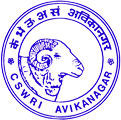BackAnnual Review Meeting of ICAR-Network Project of Sheep Improvement (NWPSI) and ICAR-Mega Sheep Seed Project (MSSP) held on 19-20th May, 2018 at Mahatma Phule Krishi Vidyapeeth (MPKV), Rahuri
Annual Review Meeting 2018 of ICAR-Network Project of Sheep Improvement (NWPSI) and ICAR-Mega Sheep Seed Project (MSSP) was held at Mahatma Phule Krishi Vidyapeeth (MPKV), Rahuri on 19-20th May, 2018. This meeting was chaired by Dr. J. K. Jena, Honourable Deputy Director General (Animal Science) and co-chaired by Dr. R.S. Gandhi, Assistant Director General (Animal Production and Breeding) and Dr. Arjava Sharma, Director (NBAGR, Karnal). Dr. Arun Kumar, Director (A), ICAR-CSWRI cum Project Coordinator, coordinated the proceedings of the meeting. The inaugural session was graced by Dr. K.P. Viswanatha, Hon’ble Vice Chancellor, MPKV, Rahuri, Dr. S. R. Gadakh, Director of Research, Dr. Y.G. Fulpagare, Head, Deptt. of Animal Science & Dairy Science, other officers and staff of MPKV, PIs and Co-PIs of ten cooperating units from different parts of the country and Nodal officers of NWPSI & MSSP.
The major aim of these projects is genetic improvement of indigenous sheep breeds through selection and dissemination of superior germplasm to the farmers’ flocks. The meeting reviewed the progress made by different sheep units during 2017-18.
Dr. S.R. Gadakh heartily welcomed everyone to MPKV campus. He outlined the sphere and spread of research activities of the university and highlighted its significant achievements. Dr. Arun Kumar welcomed all dignitaries and participants in the meeting. He highlighted the advantages of sheep farming over other species. He was of the opinion that sheep is a ‘five star’ animal capable of serving as an ATM for the poor farmers. He stressed the need to produce more sheep per sheep through concerted application of the available technologies for enhancing growth, milk, reproduction and survivability. Dr. J. K. Jena highlighted the important contribution of livestock sector in Agriculture and National GDP. He emphasized the need to bring about necessary changes in sheep production system in view of the emerging challenges it is facing now. He stressed the need to devise a successful and profitable commercial sheep farming model to meet the increasing human demand for animal protein in the country. He also underlined the importance to formulate appropriate strategies to combat the effects of climate change as sheep are mostly distributed in the regions with harsh climatic conditions. Dr. R.S. Gandhi in his address called for further exploitation of the employment opportunities existed in the sheep sector. He reminded the Hon’ble PM’s words that Scientists and farmers are the two sentinels of New India. He emphasized the need to introduce PPP model in sheep production for faster and wider multiplication resulting in greater benefits. Dr. Arjava Sharma stressed for a need to identify the new ecotypes or strains/breeds of sheep in different agro-ecologocal zones. Dr. K.P. Viswanatha in his address shared the encouraging results achieved by the University through successful implementation of an integrated farming model in the farmers’ field. He stressed the need of gradually shifting to an economically viable stall-fed sheep farming system. He informed the house that the dryland grass varieties developed by MPKV can help in pasture development to fulfil the fodder requirements for achieving higher performances from sheep production.
Dr. Arun Kumar presented the Project Coordinator’s Annual Reports of NWPSI and MSSP, Action Taken Report (ATR) on the recommendations of last review meeting and critical evaluation report of each unit. The progress report of four farm based units viz. Marwari, Muzaffarnagri, Deccani and Nellore sheep and two field based units viz. Madras Red and Magra sheep under NWPSI were presented and discussed. Progress report of four units under MSSP viz. Mandya, Mecheri, Sonadi and Malpura sheep were also presented and discussed. The meeting suggested necessary recommendations to further improve the performance of different units. It ended with vote of thanks by Dr. Y. B. Kandalkar, PI of host (Deccani) unit.
.jpg)
.jpg)
.jpg)
.jpg)









